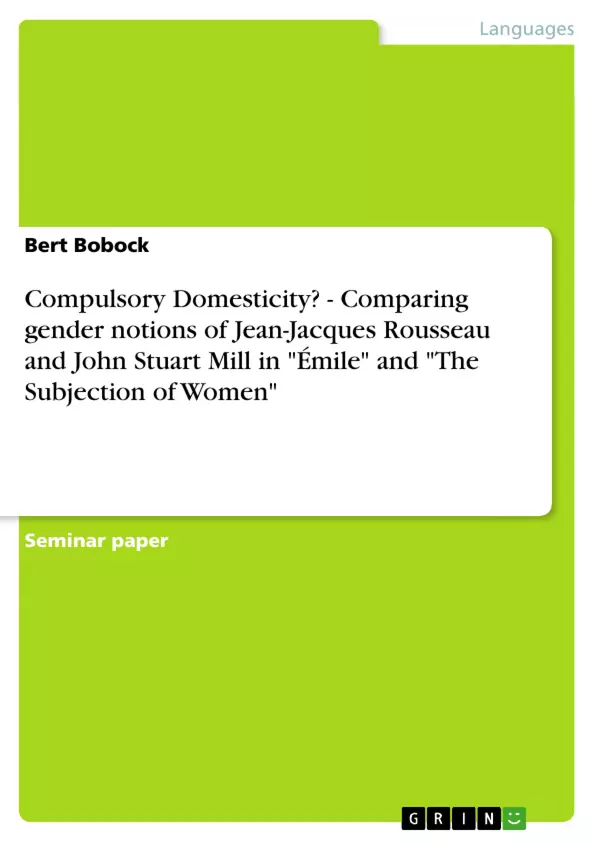Although political philosophers like Jean-Jacques Rousseau, John Locke and Thomas Hobbes thought it important that all individuals be free to govern themselves, they often based their theories of representative democracy on the nuclear family as the smallest unit in society. Since families are formed by individuals, how is it possible that these thinkers dismissed the voice of one half of the population - women?
This essay examines how gender notions shifted in the century between the publication of Rousseau’s Émile in 1762 and Mill’s “The Subjection of Women” in 1869. How can Rousseau’s general desire for equality and freedom of the individual be combined with his claim that women need to be complementary and serviceable to men? How does Mill’s concept of domesticity and his assumption that women would prefer the domestic realm, when given the choice between having a career or creating a home, relate to Rousseau’s ideas of domesticity?
Inhaltsverzeichnis (Table of Contents)
- Introduction
- Jean-Jacque Rousseau's Gender Notion
- Sophie's "Education" as a Natural Woman
- The Paradox of Reason
- Compulsory Domesticity?
- John Stuart Mill's Gender Notion
- Mill and Rousseau on Childhood Education
- Natural Differences versus violent Repression
- Conclusion: Mill and Rousseau in Critical Perspective
Zielsetzung und Themenschwerpunkte (Objectives and Key Themes)
This essay explores the shifting notions of gender during the 18th and 19th centuries by comparing the ideas of Jean-Jacques Rousseau and John Stuart Mill on women's roles in society. It examines the concepts of "separate but equal" spheres of influence for men and women, the role of education in shaping gender expectations, and the potential for social progress through the recognition of women's equality.
- The concept of "separate but equal" spheres for men and women.
- The role of education in shaping gender roles and expectations.
- The influence of natural differences versus societal pressures on gender identities.
- The potential for social progress through the recognition of women's equality.
- The relationship between individual freedom, societal expectations, and the family unit.
Zusammenfassung der Kapitel (Chapter Summaries)
- Introduction: This chapter introduces the topic of gender notions in the context of political philosophy and examines how thinkers like Rousseau, Locke, and Hobbes viewed women's roles in society.
- Jean-Jacque Rousseau's Gender Notion in Émile: This chapter focuses on Rousseau's ideal of the "natural man" and how he conceptualized the "natural woman" as a complement to this ideal. It explores Rousseau's views on the necessity of separate education for men and women, highlighting the importance of both physical and moral compatibility in marriage.
- Sophie's "Education" as a Natural Woman: This chapter delves deeper into Rousseau's arguments for Sophie's education. It examines his emphasis on educating women to be subservient to men and his justification of this through his understanding of natural differences. The chapter also explores the economic implications of Rousseau's model for society and the family.
- The Paradox of Reason: This chapter explores the contradiction between Rousseau's emphasis on individual freedom and his belief in predetermined gender roles. It investigates how his arguments for Sophie's education, while aiming for equality, ultimately perpetuate a system of male dominance.
- Compulsory Domesticity?: This chapter introduces John Stuart Mill's views on women's role in society and his critique of the prevailing inequalities. It contrasts Mill's perspectives with Rousseau's, highlighting Mill's advocacy for total equality between men and women.
- John Stuart Mill's Gender Notion: This chapter further examines Mill's ideas on gender equality. It explores his arguments for women's participation in public life and his rejection of the idea of natural differences between men and women.
- Mill and Rousseau on Childhood Education: This chapter compares Mill and Rousseau's approaches to the education of children, particularly girls. It explores the implications of their different views on how to prepare children for their roles in society.
- Natural Differences versus violent Repression: This chapter investigates the ongoing debate about the existence of natural differences between men and women. It explores how this debate influences the development of societal expectations and the potential for gender equality.
Schlüsselwörter (Keywords)
The primary focus of this essay lies on the concepts of gender, equality, freedom, and education as they are presented by prominent political thinkers like Jean-Jacques Rousseau and John Stuart Mill. The analysis delves into the notions of "separate but equal" spheres for men and women, examining the role of education in shaping gender expectations and the impact of natural differences versus societal pressures on gender identities. Furthermore, the essay explores the relationship between individual freedom, societal expectations, and the family unit, with particular emphasis on the economic and social implications of these concepts.
Frequently Asked Questions
How did Jean-Jacques Rousseau define the roles of men and women?
In his work "Émile," Rousseau argued that men and women have complementary but different natures. He believed women should be educated to be subservient and pleasing to men, focusing on the domestic sphere.
What was John Stuart Mill's view on gender equality?
In "The Subjection of Women," Mill advocated for total legal and social equality. He argued that the perceived differences between genders were the result of social conditioning and systemic repression rather than nature.
What does the term "Compulsory Domesticity" mean?
It refers to the societal expectation or pressure that forces women into the role of homemakers, limiting their participation in public and professional life.
How did education differ for Rousseau's characters Émile and Sophie?
Émile was educated for autonomy, reason, and public life, while Sophie was educated to be a companion, focusing on physical grace, moral virtue, and household management.
Why did Mill criticize the family structure of his time?
Mill viewed the traditional family as a "school of despotism" where men exercised power over women, preventing true social progress and individual freedom for half the population.
- Arbeit zitieren
- Bert Bobock (Autor:in), 2005, Compulsory Domesticity? - Comparing gender notions of Jean-Jacques Rousseau and John Stuart Mill in "Émile" and "The Subjection of Women", München, GRIN Verlag, https://www.hausarbeiten.de/document/93239


